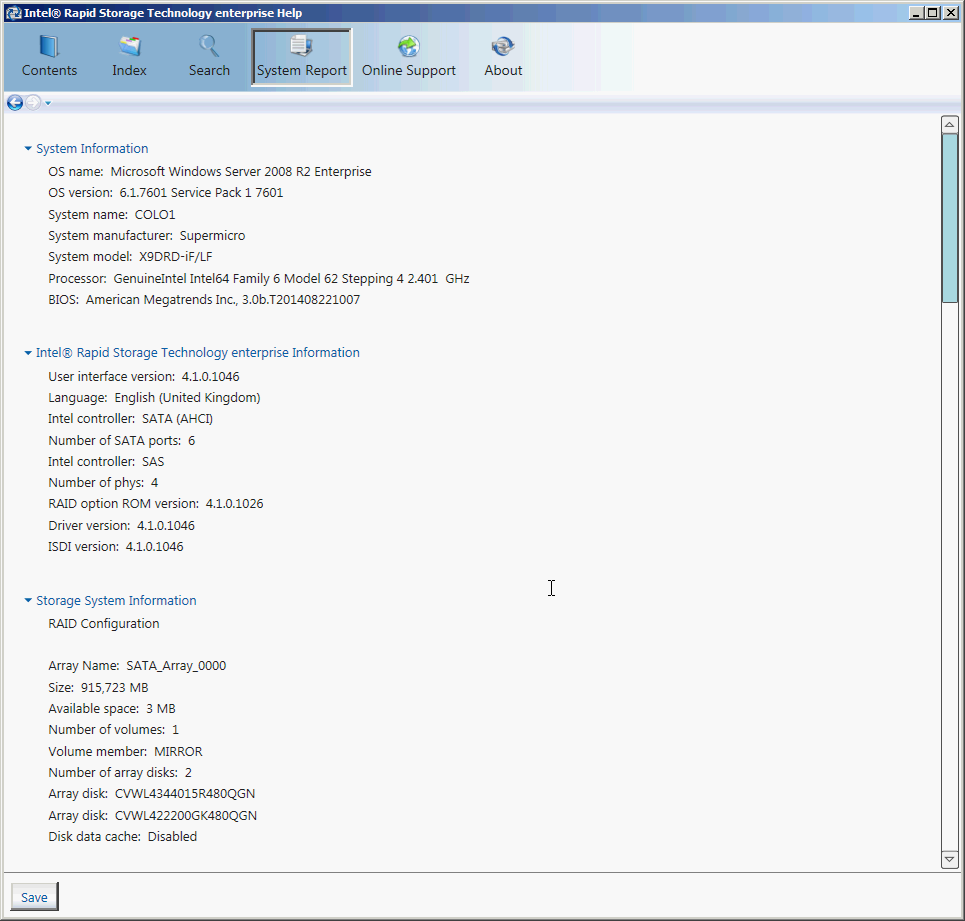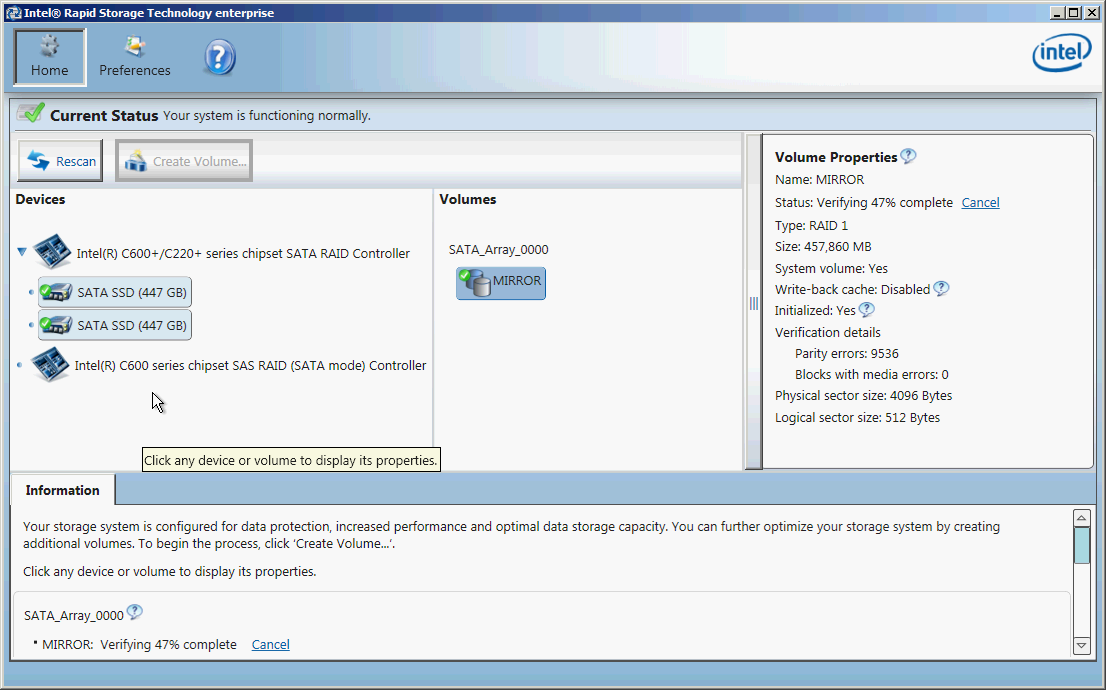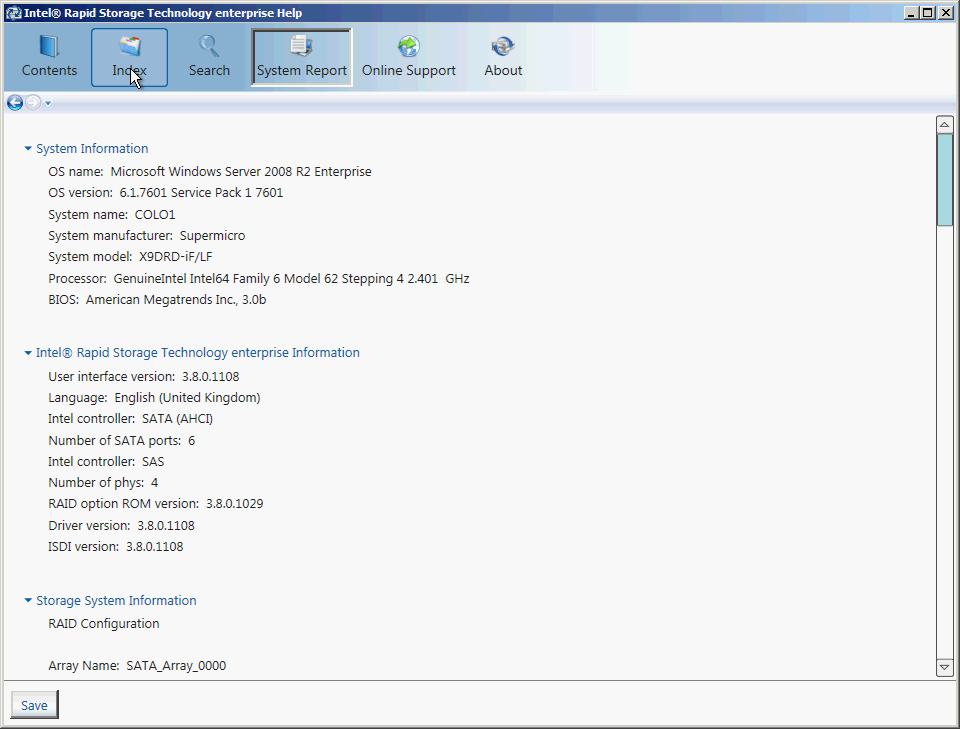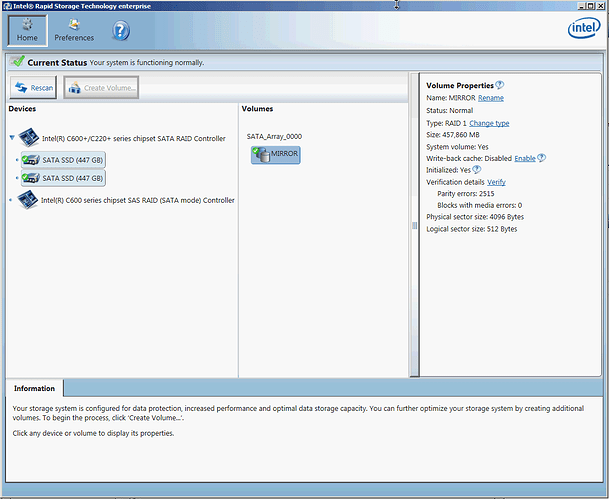I found this news on heise online today:
https://translate.google.de/translate?sl…t-text=&act=url
[in german] http://www.heise.de/newsticker/meldung/S…l.ho.2014-12-11
@ hcwuschel:
Thank you very much for your interesting info.
As a consequence I have just updated the start post of >this< thread.
@ all X99 Chipset users:
Due to the reported severe bugs of the Intel RSTe drivers v4.1.0.1046 (no TRIM in RAID0 support, limited usage of the onboard SATA ports) I do not recommend to install them.
Users, who are already running this RSTe driver, should uninstall and replace it by an actual RST driver (v13.1.0.1058 or newer).
Hi Fernando,
We are currently using the 4.1.0.1046 RSTe driver on an Intel C602 SATA RAID controller with two Intel DC S3500 SSDs in Raid 1. We’ve been having quite a few problems with Parity Raid errors using this driver.
Do you know if we can use the RST (v13) driver with the motherboard’s RAID option ROM v4.1.0.1026 (the BIOS determines this option ROM version).
I’ve attached a screenshot of our system configuration.

@ Xav:
Welcome at Win-RAID Forum!
Which OS are you running?
Unfortunately I cannot see any attachment.
EDIT: Ahhhhhhhh, now I see it!
Regards
Fernando
Thanks!
Windows Server 2008 R2 x64 Enterprise
It’s there now…
EDIT: And here’s a screenshot of the Parity errors:
I am not sure, because I suspect, that the Intel C602 SATA RAID Controller of your machine is natively not supported by the v13 series RST(e) RAID drivers.
Nevertheless you can try to get the Intel RST(e) driver v13.1.0.1058 installed, which had be modded by me to make it usable with nearly all Intel SATA RAID Controllers (look >here<), but you will have to force the installation by using the "Have Disk" button (and maybe additionally to disable the driver signature verificaton feature).
Since when have you recognized the parity errors?
In the below forum post, you suggest to use the v3.8 RSTe driver rather than the v4.1 driver seeing that Intel has secretly pulled the v4.1 drivers for Windows Server 2008 R2 (it is still there for Windows Server 2012).
Intel(R) RST/RSTe Drivers (newest: v13.5.0.1056/v4.1.0.1046 WHQL)
Do you think it is better to go with the v3.8 RSTe driver or the v13 RST driver?
We’ve had problems pretty much for the last 6 months. We got around the problem by using Windows software raid instead on the production server, although this gives us about half the read performance.
This is another thread my boss started:
RAID1 Mirror Corruption on 2008 R2 Server with Intel RSTe Controller with Intel SSD Drives
The only driver that didn’t give us any problems were the v3.6 RSTe driver, but we were running the v3.8 RAID Option ROM, which you advised us against (seeing that the drivers aren’t fully forward compatible with the Option ROM).
If I were you, I would try at first the RSTe v3.8 drivers, because they are natively designed by Intel for C600/C600+ Chipset Series systems.
Big advantage: The RAID driver version matches the RAID ROM/EFI RaidDriver v3.8.0.1029.
Thanks for your advice Fernando. I will let you know how our testing goes…
I’ve downgraded the RSTe drivers to v3.8.0.1108 and ran PassMark’s BurnInTest for just under 24 hours, and unfortunately this has also caused 9537 parity errors when I ran the RSTe verification.


I’m now testing it without the Supermicro SATA backplane, as suggested by Supermicro support.
If what SuperMicro suggested doesn’t help, why not downgrade the oROM of the machine to v3.6 and use the non-problematic v3.6 equivalent drivers? Just a thought, unless I missed something.
A couple of reasons:
1. We never had the 3.6 Raid Option ROM (from the motherboad’s firmware), but I’ve just today received an old firmware revision for our server from Supermicro support.
2. The 3.6 driver doesn’t support TRIM
3. We didn’t want to run old drivers on a production server, when the manufacturer (Supermicro) lists newer drivers on their website. We thought that these newer drivers might have bug fixes, but in hindsight the newer drivers only had new and improved bugs!
We are now going to downgrade the Option ROM and drivers to 3.6 and hopefully draw a line under this, seeing that Intel will most likely not fix the drivers (something we were always hoping to achieve by making these forum posts).
The start of each new development branch (here: v3.6, v3.7, v3.8 etc.) begins with new, previously unknown bugs.
We’ve run two sets of 24 hour tests using the BurnInTest software with the 3.6 drivers and the 3.8 Option ROM, and there as not been any parity errors.
